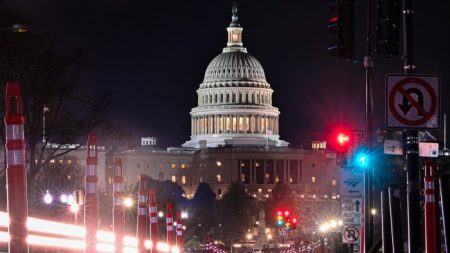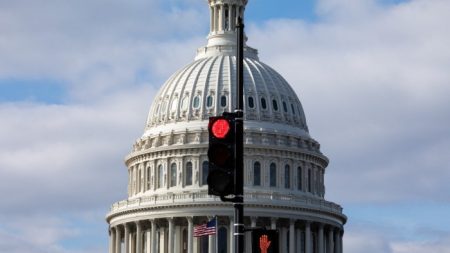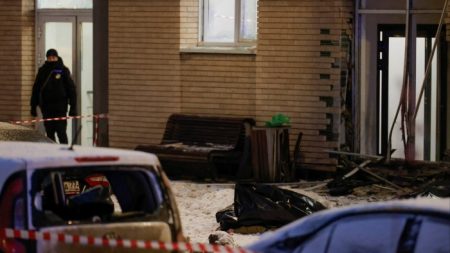Unlock the Editor’s Digest for free
Roula Khalaf, Editor of the FT, selects her favourite stories in this weekly newsletter.
Israel has launched a wave of air strikes against Houthi rebels in Yemen, dramatically widening its offensive against Iranian-backed militants just two days after assassinating Hizbollah leader Hassan Nasrallah in Lebanon.
The Israel Defense Forces said the attack against the Houthis on Sunday involved dozens of war planes and targeted power plants and ports and other infrastructure.
Israel also launched dozens of fresh strikes in Lebanon on Sunday and vowed to keep up its offensive against Hizbollah following the killing of Nasrallah, Iran’s closest regional ally, in Beirut on Friday.
Over the past two weeks, Israel’s offensive has killed more than 1,000 people across Lebanon, according to the Lebanese health ministry.
The Houthis have launched missiles and drones at Israel, merchant shipping and US naval vessels in the Red Sea since the October 7 attack by the Palestinian militant group Hamas, a fellow member of the Iran-led “axis of resistance”.
On Saturday, Israel’s military said it had intercepted a missile launched from Yemen over central Israel for the third time this month.
The Houthis, who control northern Yemen, said they targeted Tel Aviv’s international airport when Israeli Prime Minister Benjamin Netanyahu was landing after returning from the US. Israel previously launched strikes against the Houthis in July.
The strikes against Houthi targets in the Red Sea port of Hodeidah, a rebel stronghold, and Ras Issa came a day after Netanyahu said Israel was “changing the balance of power” in the Middle East.
“There is no place in Iran or the Middle East that the long arm of Israel cannot reach,” Netanyahu said.
As it continues to battle Hamas in Gaza, Israel has dealt a string of devastating blows to Hizbollah over the past two weeks and triggered panic across Lebanon with its bombing campaign.
Lebanon said on Sunday it had been hit with 216 air strikes in the past 24 hours.
Israeli strikes on Sunday killed 24 people in Ain Deleb near the southern city of Sidon and 21 people in Baalbek-Hermel in the east, the health ministry said. The last week has been one of the country’s deadliest since Israel fought a 34-day war with Hizbollah in 2006.
The IDF said that more than 20 senior members of the Lebanese militant group were killed alongside Nasrallah on Friday when Israeli planes flattened at least six residential buildings in the southern suburb of Beirut.
An Israeli army spokesman said that in another raid, 45 Hizbollah targets were hit in the Kafra village area in southern Lebanon.
Despite calls by western powers for Israel to de-escalate, Netanyahu insisted Israel would continue its offensive against Hizbollah until more than 60,000 people displaced from Israel’s north by a year of cross-border fire were able to return home.
US National Security Council spokesperson John Kirby told CNN that “an all-out war with Hizbollah, certainly with Iran, is not the way to do that”.
“If you want to get those folks back home safely and sustainably, we believe that a diplomatic path is the right course,” Kirby said.
But Kirby also reiterated the US’s military support for Israel, telling ABC’s This Week that there was “already a very robust military capability to defend ourselves and to help defend Israel if it comes to that”.
Pentagon spokesperson Pat Ryder said the US was “dynamically” adjusting its force posture in the Middle East and had increased the readiness of more US forces to deploy for various contingencies.
Lebanon’s health ministry said 14 paramedics had been killed in Israeli attacks over the past two days and that strikes hit two civil defence centres in the south and damaged a hospital in the northeastern city of Baalbek so badly that it was temporarily put out of service.
Hundreds of thousands of Lebanese civilians have been displaced, many fleeing to the already densely populated capital, sleeping in schools, on beaches and in the streets.
Israeli air strikes have also pushed tens of thousands of civilians to flee to neighbouring Syria, which is itself grappling with effects of a decade-long civil war. Lebanese state security recorded more than 41,300 of the country’s citizens and 36,000 Syrians crossing into Syria in the past week.

The constant thrum of Israeli drones has sounded over neighbourhoods across Beirut and far beyond its southern suburbs since Nasrallah’s assassination.
Lebanon’s Prime Minister Najib Mikati declared three days of official mourning for Nasrallah starting on Monday, with all public and private institutions to stop work on the day of his funeral.
Israel has raised the prospect of a ground offensive into southern Lebanon, where Hizbollah has a network of bases and weapons stores.
Hizbollah continued to fire on Israel on Sunday, but most of its rockets were intercepted or landed in open areas.
Read the full article here












